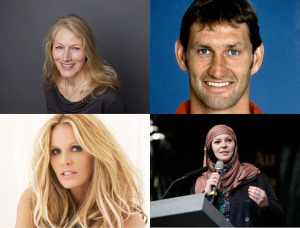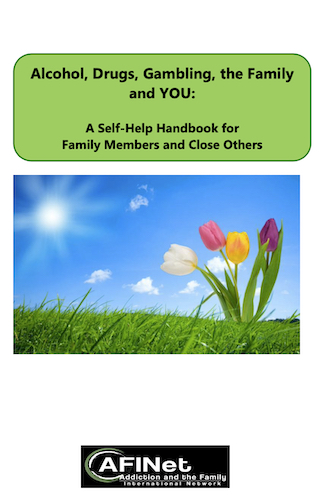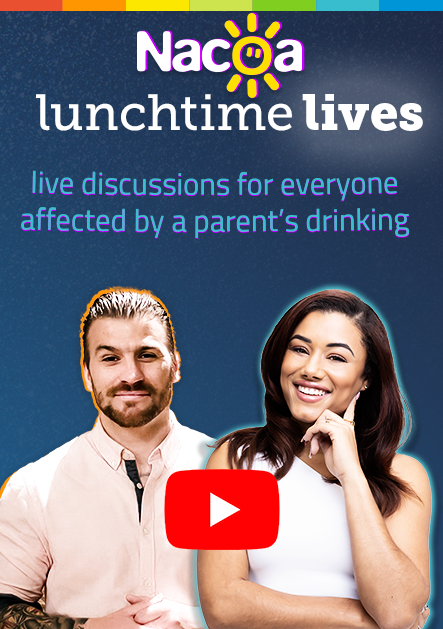
Tony Adams MBE
Founder of Sporting Chance Clinic, former Arsenal and England footballer
My parents weren’t alcoholics but I became one. To tell my story, I have to talk about Mum and Dad. My father was a smoker, died of lung cancer. He kept everything buttoned in, all his feelings. You could have called him a rage-aholic, I suppose. He was scared of the anger inside himself. My mother was obese. She overate constantly, blood pressure off the scale, and eventually died of bone cancer. They weren’t alcoholics but they were both addictive personalities and so my story starts with them. Dad was a big, powerful, dominant man. He used to come home with everything pent up inside him. He’d hit the wall instead of hitting us. Mum was indoors all the time, cooking food. Eating food. I know the charity is about the children of alcoholics but, for me, addictions come in all sorts of flavours: drink, drugs, betting and the rest. My parents had their own issues, obviously, and I inherited an addictive personality from them.
The effect we have on our children can be mysterious; poignant even. My dad had his first heart attack when I was about ten. I was already playing football but, for six months afterwards, I walked with a limp. I can see it now but didn’t then: I was worried about Dad, scared of what was going to happen. So I limped. Anyway, I had a cousin – Steve MacKenzie – who was a player at Crystal Palace. He fixed us up to go down and see the chief scout, a guy named Arnie Warren who passed on a couple of years ago now. Arnie looked at me and looked at the bump on my leg I was worried about. He got Dad to roll up his trouser leg as well. He told me that Dad had bumps on his legs from playing football and that I had a bump on mine for the same reason. He said that if I ran around the training pitch a few times the limp would disappear. Off I went and, of course, that’s exactly what happened. The limp was all a psychological thing and was gone by the time I’d run four or five laps.
My parents weren’t bad people. They were good people who were ill and didn’t ever get treatment for that. They never dealt with the issues they had hidden away. But they were good people, well-loved, and they themselves had definitely moved on from the previous generation: my dad’s father really was an alcoholic. He went at my dad once with a knife, used to throw keys at him, would come home every Saturday night and smash the place up. My dad used to describe his dad as ‘a real fruitcake’! What happened between me and my parents was a two-way street, of course. When I was on the booze, I never spoke to them. However much they might have wanted to talk to me about what was going on, they couldn’t. I’d just shut myself down emotionally. It’s a combination of born behaviours and learnt behaviours. As a kid, I was shy and insecure; quite a frightened little boy, really. Mum and Dad had never picked up on their own problems so I can’t be surprised – or resent – that they never picked up on mine as I was growing up. I’ve just had to go back for myself and deal with all that since I became sober.
I never really learnt to talk about how I was feeling when I was young. It makes me recognise how important that is now, with the next generation. My own children included. A few weekends back, I was trying to have this kind of conversation with my daughter, who’s 20. A good friend of ours was there, too, an older woman, and I recognised that it was probably easier for my daughter to talk to her than to talk to me. Probably easier for our friend to talk to my daughter than to her own daughter, too! But the thing is that young people need to be helped to be honest about their feelings. Someone needs to be there. Someone needs to be able to listen in a way that my own parents weren’t ever able to listen to me. That hurt Mum and Dad, too, of course. When I was drinking, I put them through a lot of pain. I know I did. There I was, in prison at one point, sort of being looked after, sheltered from things in a funny sort of way. My parents were on the outside, though, having to deal with what I’d done and in the public eye. After I was sentenced, I was just numb, really. My parents, though, were in bits. As I say, with what happens between parents and children when addictions are involved: it works both ways across generations. I still remember Dad coming to see me in prison: Son, what’s happened? You’re a drunk.
I got to the bottom eventually. And then I got well. Nineteen years on, I’m still a recovering alcoholic. Part of the process for me has been my charity, Sporting Chance, working with sportspeople’s addiction issues. And part of the driving force for that – and for everything else, really – has been me trying to make sure I don’t pass my issues on: I’ve got five children now and a step-daughter and two grandchildren. I’ve had some repair work to do with my three eldest although it’s only the oldest, my step-daughter who ever saw me at my worst. My eldest son has a memory of me sticking him behind a bar somewhere with a load of toy cars to play with while I went off drinking but that’s his only real recollection of those times. My step-daughter, Clare, though, saw it all: me passing out drunk, not being able to look after my own children, Clare – just seven — having to look after the little ones, having to phone her Gran to tell her what had happened. Like I say, ours is a relationship that’s needed some repairing since. Clare has said to me: you and Mum were both off the planet, you know. She’s given me some trust back now but what happens between us is a continuous process. She can still call me Dad and we talk all the time. She’s grown through it. I think we’ve grown through it. And still, with my other children, maybe the most important thing in getting myself better – keeping myself better – is making sure I don’t pass the disease, alcoholism, that I suffered from on to them.
Lauren Booth
Journalist and Broadcaster
The other morning was bright and warm for September, so my eldest daughter and I ditched the car in favour of a long walk into our nearest town, Stockport. On the way home, we passed by the back of pub whose doors were wide open, as staff began the morning cleaning routine.
A mis-timed breathe, filled my nose and throat with the scent and taste of old beer.
‘Oh God, awful..’ I covered my mouth. But it was too late. In an instant I was back in my childhood home.
‘Are you there? Are you there? I’m back from school…’
Through the letterbox bearing, scorch marks from a fire, I could smell the precise amount of beer my parent had drunk that afternoon. My tally wasn’t in pints, it was in the scale of effect the amount of booze would have on the evening ahead.
Level 1 meant my parent had run out of money and was fairly sober and genuinely couldn’t hear me calling to be let in. Dinner would eventually appear and (unless parent’s alcoholic partner turned up with more beer), there would be money for the meter and the chance I’d be allowed into the living room to watch a TV show before bed.
Level 2 meant my parent had staggered home, sober enough to have remembered to buy something for dinner. There would be sarcastic and hateful comments and perhaps a brief, violent, outburst, on the plus side, there could also be a Findus packet dinner and the chance I’d be allowed to have the electric heater on while I did my homework in the icy, hallway.
Level 3 meant, parent was paralytic and had been put into a taxi by the landlord of the Hare and Hounds, at closing time (back then 3pm). My parent had possibly found the bottle of vodka I’d hidden and spent the remainder of the dole money on four Carlsberg Special Brews and the taxi. If woken from their sofa-coma by my pleading, they’d open the door, with the cheery greeting.
‘You little s**t’ always moaning and whingeing.’ If I cried, I’d be told to stop or:
‘You’ll be given something to cry about’.
Later in the evening, being caught searching the kitchen for ‘emergency rations’ (as my grandparents called their weekly food drop), risked sneers turning to punches, or kicks. I’d go to bed hungry and cold, in complete darkness. None of which, I suppose, would have been that bad. Except that whilst living in this condition, I was also bullied at school for (ironically) being ‘posh.’
I had nightmares.
If the beer-sweat seeping through the letterbox warned me of a Level 3, I’d call a couple more times and then, consider going to my friend’s house where her mother usually cooked dinner. That was, if. She wasn’t too high on cocaine to manage it.
Sometimes, I would do my homework by the balcony on the stairwell, looking out over the gardens. As darkness fell, I would watch the lights go on brightening the other apartment, seeing other families making their dinner, laughing and joking together. Dad’s arriving home in nice cars. Mum’s serving homemade food from ovens which didn’t suddenly go cold because no one had 10 pence for the electricity meter.
You see, I was the scruffy kid, belonging to the ‘neighbours from hell.’ People walked over me on the stairs to get home, irritated by my presence. I know what the homeless must
feel like to be ignored by those who are better off. What the neighbours didn’t know was how much I wanted to live a quiet life. I was a naturally shy, swotty kind of girl. I longed to be a part of a ‘nice’ family. I was embarrassed by the noises coming from my home night after night. I hated the swearing (even as I picked it up – a lifelong habit I still struggle with).
I loathed the brutal, alcohol-induced violence between parent and lover broadcast through loose-fitting windows to the same families, who ignored me as I sat with my school bag on the stairs.
This is where Nacoa comes in. A vital lifeline of support and information for children in this kind of situation. For the innocent victims of a family member’s addiction, who as a result find ourselves temporarily at the bottom of society’s heap. Not only children but adults too, struggle to come to terms and to deal with parental alcoholism and its effects. Nacoa tells us, we are not alone and are not to blame for the situation.
Their volunteers remind the socially and emotionally wounded, that we don’t have to follow the pattern set by our parents during our childhoods.
At eight pm, if I heard the telly go on inside our flat, I would dare myself to climb the stairs.
‘Don’t be scared. You can do this. You’re strong.’
Passing by the Cheshire pub, my daughter Alexandra put an arm around me. I looked at her and thanked God that alcohol is no longer a part of our lives.
I had my last drink in 2010, after almost thirty years thinking binge drinking was the same as ‘social’ drinking. Which, sadly, it is these days.
I thank God for having the strength to break with the past and for having children who, as a result, don’t live with the fear and uncertainty, I did.
Don’t worry mum.’ said Alex.
‘Everything’s fine now. Let’s go home and have a cup of tea.’
To any child reading this, I want to say; you can break the chain. The one you feel ties you to the same lifestyle and the same actions as the addicted adult in your home. You are your own person, with your own talents and your life stands before you.
Always remember that, believe it or not, there are others worse off than you are. The actor and comedian Billy Connolly suffered terrible abuse at the hands of his father. He now has Parkinson’s disease, yet describes himself as the ‘most optimistic man in the world.’ He says his philosophy is:
‘If you think you’re having a bad time, the graveyard’s full of people who would love to be doing what you’re doing.”
Be grateful for your health, your talents, your youth. I would also add, pray. Have hope – and a sense of humour. And remember.
Things will not always be like they are right now.
Geraldine James OBE
Actor
My mother was an alcoholic and my father, a doctor, divorced her when I was 14. My brother and sister and I had no one to turn to, and we never spoke about it. We all conspired to keep ‘the secret’ and remained hidden. I had to create a world for myself.
I couldn’t tell anyone, ‘It’s Christmas Day. Mummy’s in bed and no one’s cooked us dinner.’ We thought we were freaks. When you’re a child, you blame yourself and think you’re a bad person because Mummy is in bed crying and won’t get up or has one of her ‘head-aches’ again.
We had problems, but she was also a glorious woman. I remember when I was 13 and I started my period, she flung her arms around me and said, ‘You are a woman now.’ She celebrated me being me and that felt wonderful. I’ve never forgotten that feeling of pride and happiness but I had to learn to be strong and mother my mother.
We were never allowed to talk openly about her drinking. I remember my brother being slapped very hard when he asked my father if she was drunk. We were told ‘never use that word in this house again.’
I learned to cope, to lie, and to pretend to be grown up, to put on a brave face, to look after everyone else and to be the parent. This helped us to look good as a family but inside I felt lost. There was no one there, inside or out.
If only Nacoa had been there then; offering us someone to listen uncritically; someone to give support and help; someone to trust. But there was literally no one.
And so, I talk about my mother’s drinking today because I want children to know that they are not alone and that they can do more than just survive, they can, with help, build happy and fulfilled lives for themselves.
I am fifty and I am still the child of an alcoholic!
Elle Macpherson
Businesswoman, Actress and Model
This is not my life but the life of a five year old girl who reminds me why Nacoa’s work is so close to my own heart.
Orla began the first call to Nacoa asking why her Mum is angry with her, why does Mum drink and how can I stop her drinking. She said that she was worried about her Mum as she had locked herself in the bathroom the previous night and was still there. Her Mum had said that she wanted to die and would be dead in the morning and told her to use the green button on the phone to call for help (Mum had programmed the Nacoa Helpline number on her mobile).
Orla said she did not want to call an ambulance as they would bash the door down and her Mum would be cross with her. Our Volunteer Helpline Counsellor, Ann-Marie explained that calling the ambulance would be the best decision at this point and told her we would be here for her if she wanted to ring back. The caller said that she would call the ambulance.
She called again when the Emergency Services had arrived and the bathroom door was forced open. Orla said that her Mum’s nose and mouth were blue and that she was not breathing. She had touched her hand and it was cold. She said ‘Mum’s not breathing and they want to take me away’.
Orla ran into her Mother’s bedroom and locked the door so the police could not reach her. She wanted to stay in her Mum’s room and did not want to let them in. Anne-Marie said that she would stay on the phone with her. She was crying and repeating that she did not want to go with the police. Anne-Marie was saying: “we are here for you and want you to be safe”. Orla said “I’m going to run when the door opens” and hung up.
Our Volunteer Helpline Counsellors were able to guide Orla through this devastating time. Although sadly we could not change the events of that day, we were able to support her to call the Emergency Services. With careful training and working as a team, our volunteers are able to be there for children like Orla; offering ongoing support whenever they need it and wherever their paths take them.
This story touched my heart, and is just one of many, and why this crucial service is needed – it’s a safe place for some of the most vulnerable and invisible children in the UK today.




























































































